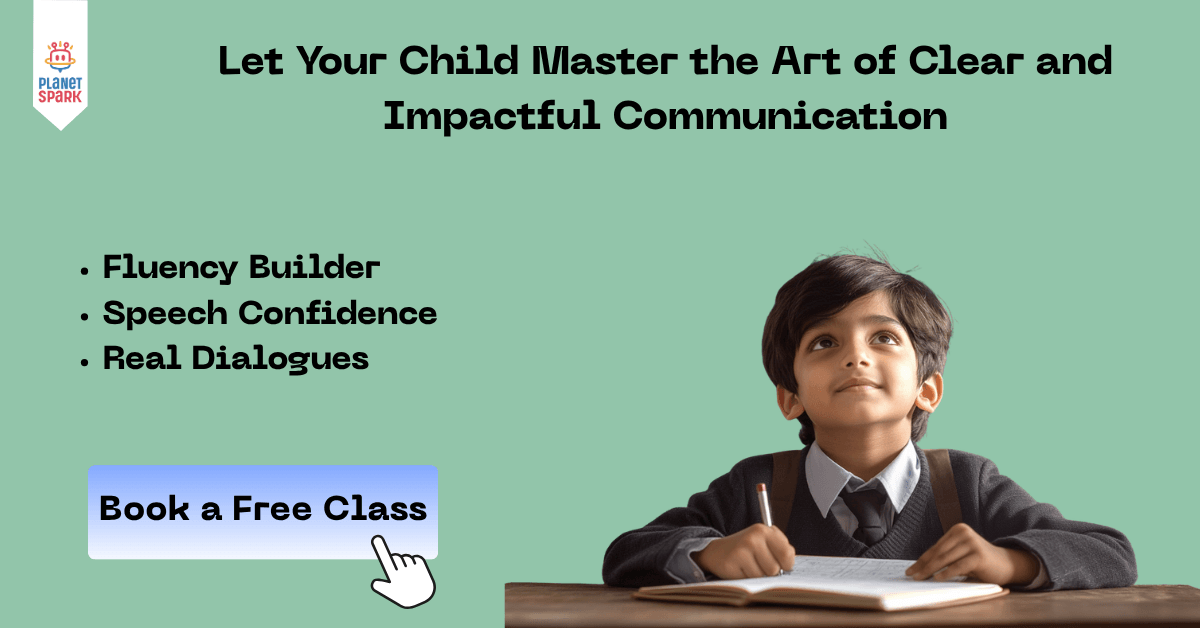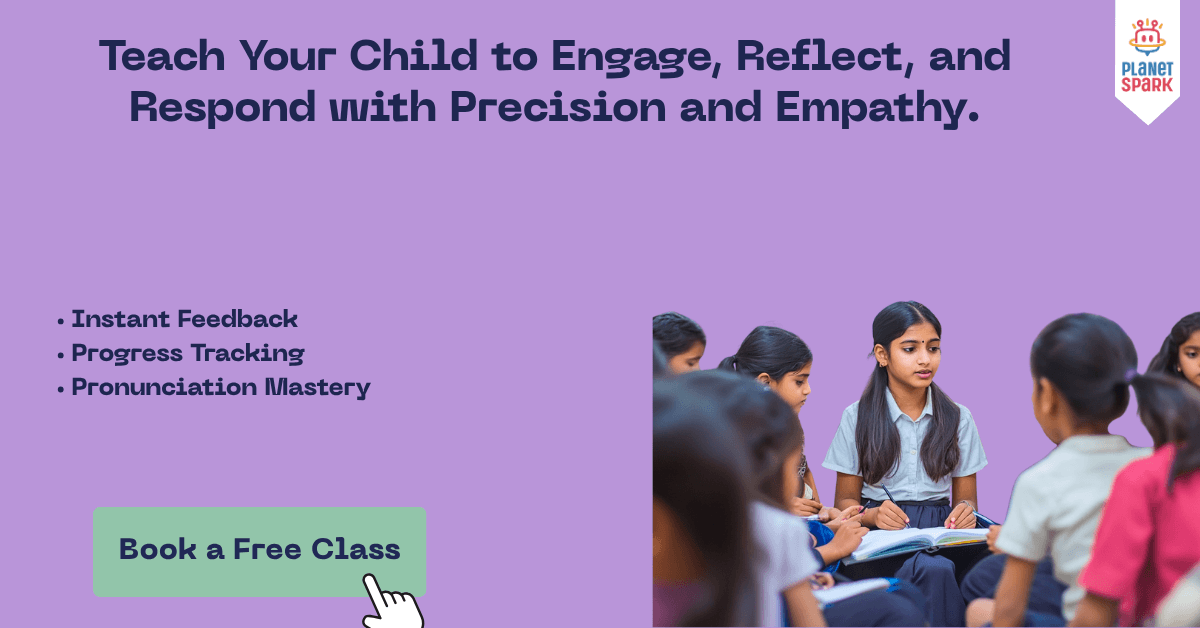What Is Effective Listening? Key Traits & Benefits Explained

Effective listening is more than just hearing words. It’s an active, intentional process of understanding and responding to what someone is saying. In today’s world, especially for students and young learners, effective listening is a critical skill for academic success, strong communication, and emotional intelligence. But what exactly does it involve, and why does it matter so much?
In this blog, we’ll answer the question: What is effective listening?, and explore how it works, why it’s important, and how children can be taught to master this powerful skill. We’ll also share how PlanetSpark helps children build strong listening abilities that benefit them in academics, social interactions, and future career success.
What is Effective Listening?
Effective listening is the ability to actively absorb information, understand its meaning, and respond thoughtfully. Unlike passive hearing, effective listening requires focus, engagement, and critical thinking. It involves both verbal and non-verbal cues, such as nodding, maintaining eye contact, and asking relevant questions.
Effective listening includes:
- Concentrating on the speaker without distractions
- Understanding both verbal and non-verbal cues
- Processing the message with empathy and clarity
- Providing feedback that demonstrates comprehension
When children develop effective listening skills, they become better learners, stronger communicators, and more emotionally intelligent individuals. It's not just about listening to instructions in school but also about understanding stories, empathizing with peers, and engaging meaningfully in conversations.
Key Components of Effective Listening:
- Paying Full Attention: No distractions—physical or mental.
- Interpreting the Message: Understanding both verbal and non-verbal cues.
- Reflecting and Clarifying: Asking questions, summarizing, or nodding to show understanding.
- Responding Thoughtfully: Giving feedback that’s relevant and respectful.
- Retaining the Information: Remembering key points for future use.
According to leading child communication experts and educational platforms like Scholastic, Understood.org, and British Council Kids, effective listening is central to helping children perform better in class and build healthier relationships with peers and adults alike.
Difference Between Hearing and Listening
| Criteria | Hearing | Listening | Effective Listening |
|---|---|---|---|
| Definition | Perceiving sound | Paying attention to sound | Understanding, interpreting, and responding to what is heard |
| Involves | Ears | Ears + Brain | Ears + Brain + Heart |
| Outcome | Passive awareness | Basic understanding | Meaningful engagement |
Example: When a teacher gives homework instructions, a child who is simply hearing may miss key details. A child who practices effective listening not only understands the task but may also ask clarifying questions or summarize it. The depth of engagement determines how well a child retains and applies information.
Help your child become a confident communicator. Enroll them in PlanetSpark’s Communication Skills Course and book a free trial session today.
Why is Effective Listening Important for Kids?
1. Builds Better Academic Performance
Students who listen effectively grasp concepts faster, retain knowledge longer, and perform better on assessments.
2. Enhances Communication Skills
Listening well helps children respond thoughtfully, ask better questions, and express themselves more clearly.
3. Develops Empathy
When children listen carefully to others, they begin to understand perspectives different from their own.
4. Reduces Misunderstandings
Good listening reduces the chances of conflict, confusion, and repeated instructions.
5. Encourages Self-Control and Focus
Active listening builds patience and attention span, which are critical in both academic and social settings.

Characteristics of Effective Listening
1. Full Attention
Effective listening begins with undivided attention. This means setting aside distractions—like digital devices, background noise, or wandering thoughts—and focusing solely on the speaker. When children learn to give their full attention, they grasp not just words but tone, emotion, and intent. This strengthens comprehension and reduces miscommunication in both classroom and social settings.
2. Feedback Loop
A core element of effective listening is a continuous exchange—a feedback loop—between speaker and listener. Children who nod, maintain eye contact, or offer small verbal affirmations (“I see,” “That makes sense”) show they are actively processing information. This not only encourages the speaker but also helps the listener retain and internalize what’s being said.
3. Non-Interruptive Behavior
Interruptions break the flow of communication and show a lack of respect for the speaker’s message. Teaching children to patiently wait their turn to speak helps build discipline and reinforces their understanding of conversational structure. It also allows them to absorb a speaker’s complete thought before forming a response—an essential part of critical thinking and empathy.
4. Empathy
Empathetic listeners go beyond just hearing—they strive to understand how the speaker feels. This emotional insight helps kids respond more thoughtfully and form stronger social bonds. In a learning environment, empathy allows students to connect with diverse perspectives, improving collaboration and mutual respect.
5. Open-Mindedness
Effective listeners are open to hearing ideas that may differ from their own. They avoid making premature judgments or forming rebuttals before the speaker finishes. Cultivating open-mindedness helps children grow intellectually, as they become more willing to consider new viewpoints and learn from them.
6. Clarity Seeking
A good listener is not passive—they actively seek to understand. This means asking relevant questions or requesting clarification when needed. Teaching children to say things like “Can you explain that again?” or “Do you mean…” empowers them to learn actively rather than assume or guess.
Why These Traits Matter
Together, these characteristics form the foundation of effective listening—a skill that enhances every aspect of a child’s development. By practicing these traits, children become more confident speakers, better learners, and more compassionate individuals. In both academic and real-life scenarios, these skills promote stronger relationships, improved focus, and deeper understanding.
Types of Listening
To understand effective listening better, it's helpful to differentiate between various types of listening:
1. Discriminative Listening
Basic level of distinguishing different sounds, tones, and cues.
2. Comprehensive Listening
Understanding the meaning of words and sentences. Key in classrooms.
3. Critical Listening
Evaluating arguments and messages. Useful in debate, reasoning, and logic.
4. Therapeutic Listening
Listening to provide support or comfort. Key to building social-emotional skills.
5. Appreciative Listening
Enjoying and engaging with music, storytelling, or speeches.
Build strong conversational and listening skills in your child. PlanetSpark offers a free trial session for its proven Communication Skills Course.
Benefits of Effective Listening for Kids
- Improved Academic Results: Understanding teacher instructions and lessons.
- Better Peer Relationships: Respecting others' thoughts leads to better friendships.
- Enhanced Emotional Intelligence: Recognizing feelings in conversations.
- Stronger Speaking and Writing Skills: Listening to stories improves vocabulary and grammar.
- More Confidence in Public Speaking: Knowing how to listen helps in structuring responses.
Barriers to Effective Listening in Children
Even adults struggle with effective listening, so it’s no surprise that children face their own set of challenges.
- Distractions: Gadgets, background noise, and multitasking
- Short Attention Span: Difficulty focusing for long periods
- Emotional Blocks: Stress, anxiety, or negative emotions
- Lack of Interest: When content feels boring or irrelevant
- Misinterpretation: Especially when the vocabulary is unfamiliar or too advanced
Parents can create a listening-friendly environment by reducing background noise, maintaining routines, and modeling good listening behavior.

How to Teach Effective Listening to Kids
1. Model Good Listening Behavior
Children mirror adults. If you make eye contact, nod, and respond thoughtfully, they’ll do the same.
2. Use Listening Games
Play games like "Simon Says," "Telephone," or storytelling exercises.
3. Encourage Active Participation
Ask open-ended questions and let kids summarize what they heard.
4. Teach Note-Taking Skills
Simple mind-mapping and keyword jotting can help kids retain more.
5. Provide Constructive Feedback
Praise them for listening well. Gently correct when they miss something important.
Give your child the gift of powerful communication. PlanetSpark’s Communication Skills Program starts with a free trial session, join now!
Activities That Promote Effective Listening
- Simon Says: Enhances auditory processing and attention.
- Listening & Drawing: Kids listen to descriptions and draw accordingly.
- Guess the Sound: Identify sounds from nature, home, or objects.
- Musical Chairs with Instructions: Pause the music and ask a question instead of eliminating players.
- Podcast Clubs: Children listen to short podcasts and discuss the themes.
These activities promote focus, recall, and collaborative learning.
Effective Listening in Online Classes
Online learning presents unique challenges:
- Children get distracted by their surroundings.
- Passive screen time reduces interaction.
- No physical cues from the teacher are interpreted more harshly.
Solution: Platforms like PlanetSpark design sessions that are:
- Short and structured
- High on interaction (polls, quizzes, questions)
- Based on real-life scenarios and activities
Want your child to speak clearly and confidently? Try PlanetSpark’s expert-led Communication Skills Classes with a free trial class.
Real-World Applications of Effective Listening
- Classroom Success: Understanding lessons, instructions, and assignments
- Friendships: Building meaningful relationships
- Conflict Resolution: De-escalating situations and finding mutual solutions
- Public Speaking: Responding thoughtfully to audience questions or feedback
- Career Readiness: Most recruiters say that listening is a top 5 soft skill they look for
Final Thoughts
Effective listening is a life-defining skill that contributes to academic excellence, emotional well-being, and confident communication. The earlier children learn to listen with purpose and understanding, the better they connect with the world around them.
It takes intention, patience, and structured efforts, but the results are lasting. Every parent and educator plays a role in guiding children to become active listeners. Start today, and the benefits will reflect in their conversations, achievements, and personalities.
Nurture early speaking and listening skills in your little one. PlanetSpark’s Communication Course for young kids includes a free trial class.
How PlanetSpark Helps Your Child Master Effective Listening
PlanetSpark integrates effective listening deeply within its communication skills programs. Here's how:
1:1 Personal Trainers for Every Child
Every student is paired with a certified communication expert. These trainers:
- Understand your child’s pace, learning style, and personality
- Deliver one-on-one live sessions that keep attention high
- Give instant, relevant feedback
- Develop fluency, grammar, storytelling, and public speaking skills
This approach ensures deeper engagement and rapid skill-building.
Personalised Curriculum and Roadmap
Based on an initial skill assessment, every child receives a tailored curriculum that:
- Focuses on grammar, listening, vocabulary, fluency, and delivery
- Progresses from simple sentence formation to advanced public speaking
- Evolves dynamically with your child’s pace and performance
SparkX – AI Video Analysis Tool
Children upload speeches and receive AI-based evaluations on:
- Voice clarity and modulation
- Body language and posture
- Grammar and confidence
- Structure and organisation
Parents receive detailed reports to track improvement.
AI-Led Practice Sessions
Students can practise independently with AI simulations that:
- Offer real-time prompts
- Provide automated feedback
- Enhance fluency, grammar, and timing
Spark Diary
A digital journal to build daily writing and reflective thinking. Kids:
- Write stories, poems, and reflections
- Develop creative writing and expression
- Receive trainer prompts for guided improvement
Gamified Learning
With modules like:
- Grammar Guru Challenge
- Word Wisdom
- Spell Knockout
- Daily Quizzes
Children stay engaged, learn faster, and practise effectively.
Structured PTMs and Progress Reports
Regular meetings and reports help:
- Monitor the child’s growth
- Discuss strengths and challenges
- Adjust future goals
Exclusive Clubs and Contests
Children can join Debate Clubs, Podcasting Clubs, and Writing Guilds to:
- Collaborate with peers
- Gain stage experience
- Express themselves freely
Sparkline & SparkShop
Sparkline: A safe platform to share speeches and writings. SparkShop: Access eBooks to boost grammar, vocabulary, and reading skills.
SparkBee
Daily quiz games to reinforce grammar, listening, and vocabulary in a fun way.
PlanetSpark transforms passive hearing into purposeful and effective listening that helps children become confident, expressive, and successful communicators.
Want your child to grow into a leader? Begin with strong speaking and listening skills. PlanetSpark offers a free trial session to get started.
7 FAQs on What is Effective Listening?
Q1. What is the meaning of effective listening?
Effective listening means actively focusing, understanding, and appropriately responding to the speaker.
Q2. Why is effective listening important for students?
It improves comprehension, helps retain information, and builds communication and social skills.
Q3. How can I teach my child to be a better listener?
Use storytelling, role play, active questioning, and encourage full attention during conversations.
Q4. What are the qualities of an effective listener?
Empathy, patience, concentration, responsiveness, and a non-judgmental attitude.
Q5. Is effective listening a skill or a habit?
It is both—a skill that can be developed and a habit that can be nurtured over time.
Q6. What are examples of effective listening in children?
When they follow multi-step instructions, ask thoughtful questions, or summarize what they heard.
Q7. How does PlanetSpark improve listening skills in kids?
Through live 1:1 training, AI tools like SparkX, gamified modules, writing journals, and interactive clubs are designed to build listening comprehension in engaging and structured ways.
Personalized Communication Report
Record a video to get a AI generated personalized communication report for your child

Hi There, want to try these
tips for your child with
LIVE with our expert coach?
Let's check your child's
English fluency
